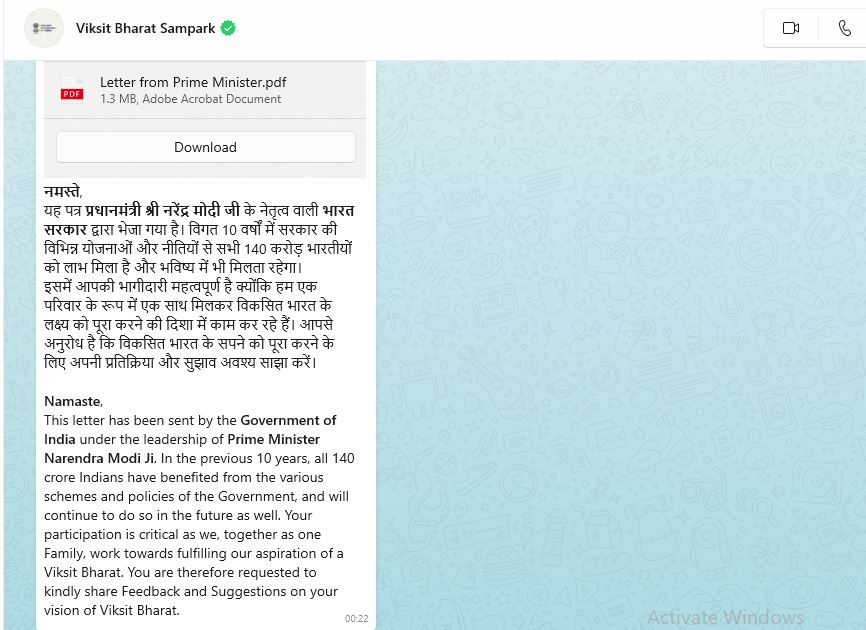
Chandigarh election authorities flag BJP's bulk WhatsApp messages as MCC violation
text_fieldsControversy has erupted in Chandigarh ahead of the general elections as election officials raise concerns over bulk WhatsApp messages from the ruling Bharatiya Janata Party (BJP), asserting that these messages, featuring a letter from Prime Minister Narendra Modi, violate the Model Code of Conduct (MCC).
The messages, sent under the banner of 'Viksit Bharat Sampark', tout the achievements of the Modi government over the past decade and solicit feedback from recipients. However, the timing of these messages—emerging just after the announcement of the general elections—has drawn scrutiny and allegations of misuse of government machinery for political gains.
A complaint was lodged through the Election Commission of India's (ECI) C-Vigil App by a Chandigarh resident, prompting the local authorities to take action. Vinay Pratap Singh, Chandigarh's returning officer and deputy commissioner, confirmed that the matter was referred to the District Media Certification & Monitoring Committee, which determined it to be a prima facie case of MCC violation.
Singh explained that since the issue pertains to the Government of India and Meta (the parent company of WhatsApp), it transcends the jurisdiction of Chandigarh alone. Consequently, the matter has been escalated to the ECI for further investigation and appropriate action.
Opposition leaders, including Shashi Tharoor and Manish Tewari, have been vocal in condemning the dissemination of these messages. Tharoor, in a statement, questioned whether the ECI would address what he termed as "blatant misuse of government machinery" for partisan political purposes. He highlighted instances of individuals from countries like the UAE and the UK expressing concern over receiving unsolicited messages from the BJP.
Tewari echoed similar sentiments, labelling the WhatsApp messages as a violation of both the Model Code of Conduct and the Right to Privacy. He raised questions about the source of the mobile numbers used for sending these messages, suggesting potential unauthorized access to personal data.
Srinivas Kodali, writing for The Wire, shed light on the complex ecosystem through which voter information is sourced by political parties, involving government machinery, data brokers, and grassroots party workers. He emphasized the interconnected nature of this information flow, with data often exchanged between the government and political entities.
The controversy surrounding the BJP's WhatsApp messages underscores broader concerns regarding the use of technology in political campaigning and the protection of citizens' privacy rights. As the ECI takes up the matter for review, stakeholders await clarity on the legality of such practices and the enforcement of regulations to safeguard electoral integrity.
Meanwhile, the BJP has not issued an official statement on the matter, leaving room for speculation about their stance on the allegations of MCC violation. With general elections looming large, the outcome of this investigation could have significant implications for the use of digital platforms in political communication and the accountability of political parties in adhering to electoral guidelines.

















